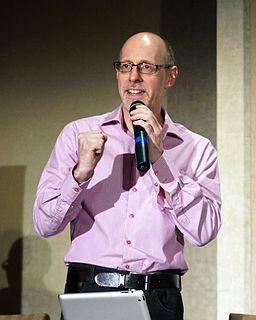A Quote by J. D. Vance
For decades, scholars have studied the ways in which implicit biases affect how we perceive other people in this multiethnic society of ours. The data consistently shows that about 90 percent of us possess some implicit prejudices - and, unsurprisingly, people typically favor their own group.
Related Quotes
We're starting to realize that magicians have a lot of implicit know-ledge about how we perceive the world around us because they have to deceive us in terms of controlling attention, exploiting the assumptions we make when we do and don't notice a change in our environment. There is an enormous amount of really detailed instruction on how to perform magic. People are always blown away by how detailed a description you'll have.
What democratic socialism is about is saying that it is immoral and wrong that the top one-tenth of 1 percent in this country own almost 90 percent - almost - own almost as much wealth as the bottom 90 percent. That it is wrong, today, in a rigged economy, that 57 percent of all new income is going to the top 1 percent. That when you look around the world, you see every other major country providing health care to all people as a right, except the United States.
Now, in practice, in daily social interactions, etc., there may be all kinds of biases and prejudices that are unspoken, that people aren't aware of, that affect who's hired, and who gets loans, and how kids are treated in school. But it's a powerful thing if you have on your side an idea that the overwhelming majority of people believe in because that's how you can build a consensus that's lasting.
We get more data about people than any other data company gets about people, about anything - and it's not even close. We're looking at what you know, what you don't know, how you learn best. The big difference between us and other big data companies is that we're not ever marketing your data to a third party for any reason.
I was in the second year of my PhD when I first had the idea - I'd recently started working as a translator, which meant firstly that I was hearing about amazing-sounding books from other translators, and also that I was getting enough of an insider's view of the publishing industry to be aware of all the implicit biases that made it so difficult for these books to ever get published, especially if they weren't from European languages (harder to discover, editors can't read the original, lack of funding programmes, authors who don't speak English).
In every human society of which we have any record, there are those who teach and those who learn, for learning a way of life is implicit in all human culture as we know it. But the separation of the teacher's role from the role of all adults who inducted the young into the habitual behavior of the group, was a comparatively late invention. Furthermore, when we do find explicit and defined teaching, in primitive societies we find it tied in with a sense of the rareness or the precariousness of some human tradition.
We are a very open, very democratic site, which means we get all sorts of people. We do get some bad guys who are a few fries short of a Happy Meal. So we have to enlist the aid of our community to help us. The lesson implicit in this is that people will help you out and behave in a really good way. If you trust them, they will respond to that trust.
It's for scientists to lay out the data and lay out what they think, and then it's for the public to make up its own mind. We don't live in a priesthood where some small group imposes its views on other people - that's not the way that science works, and it's not the way a democratic society should work.



































